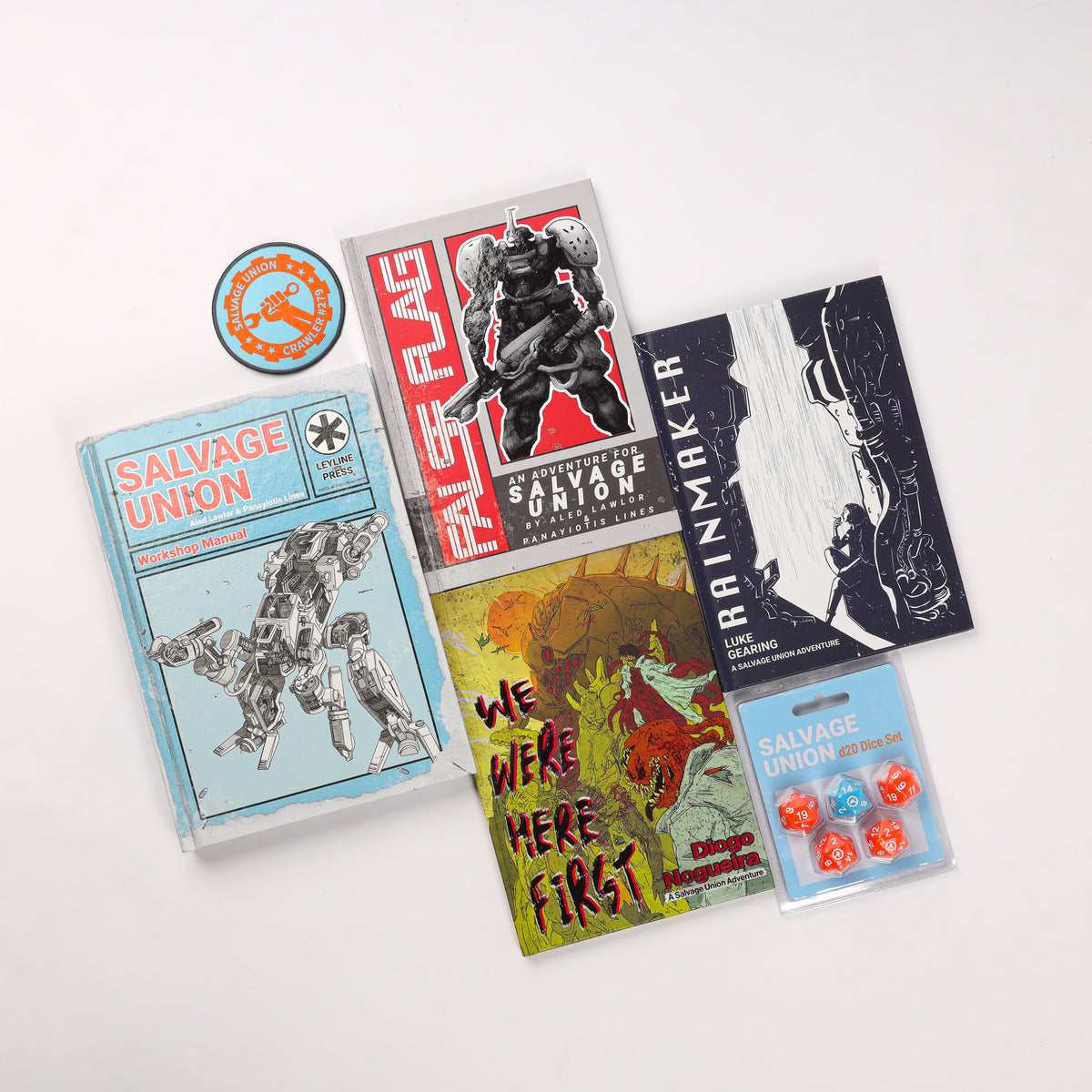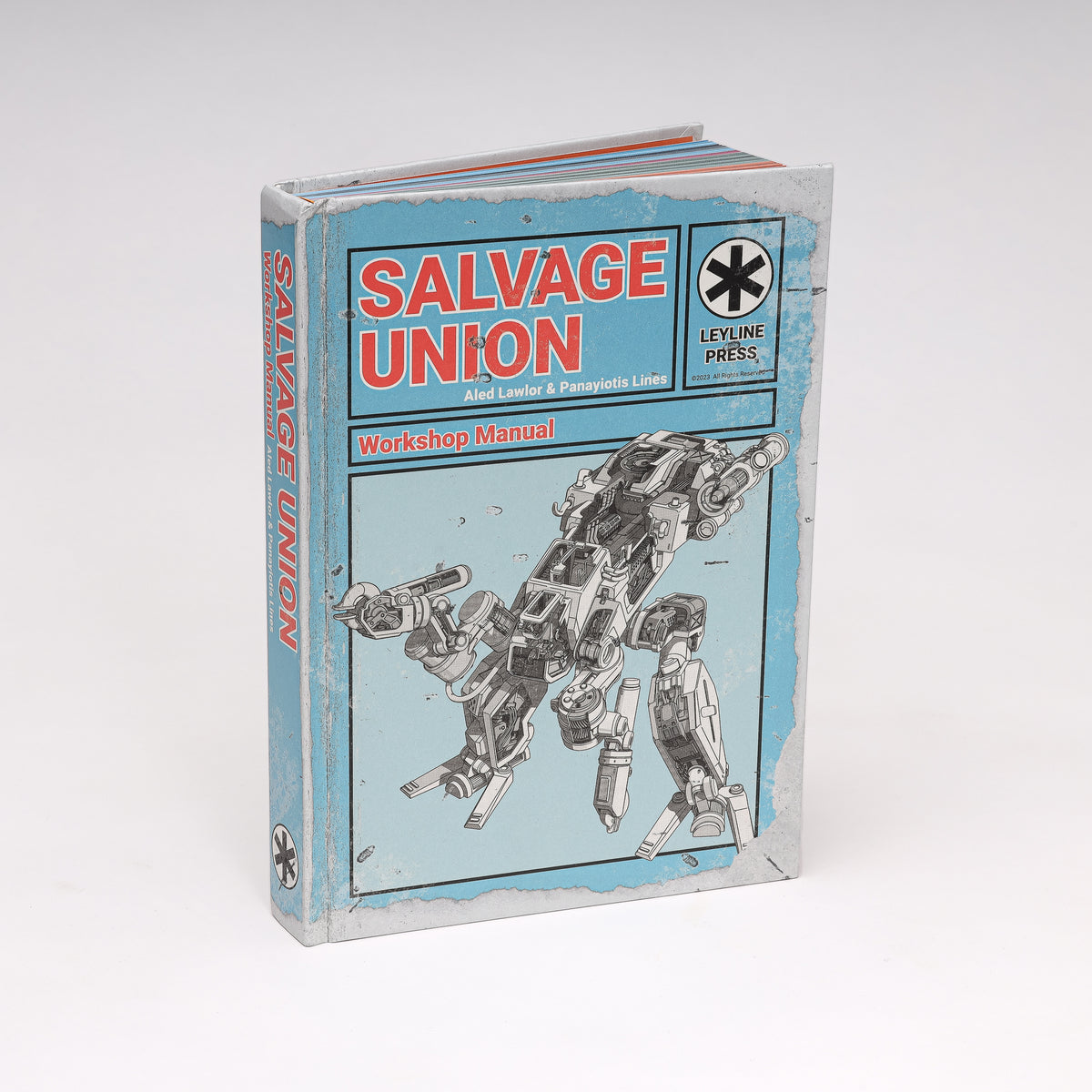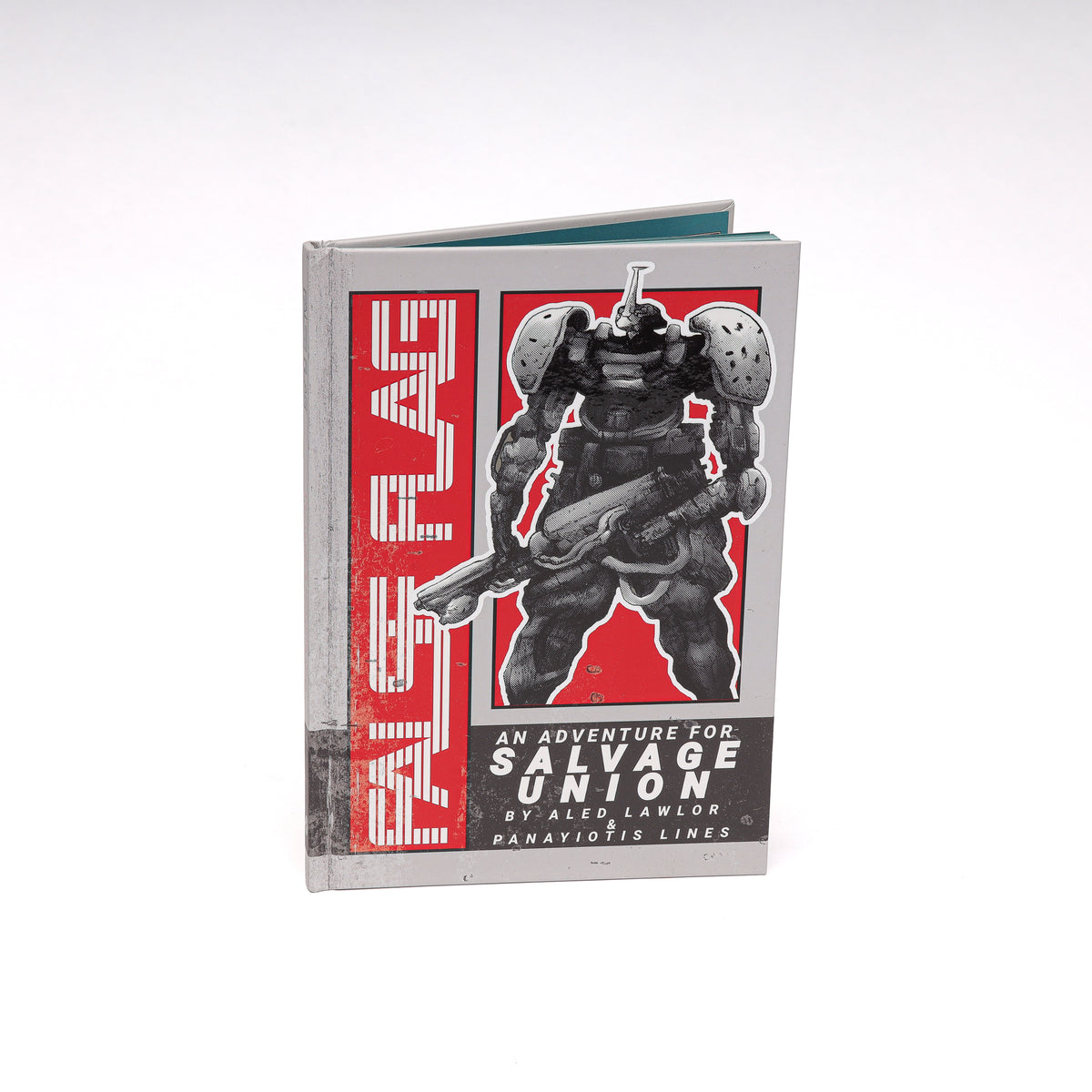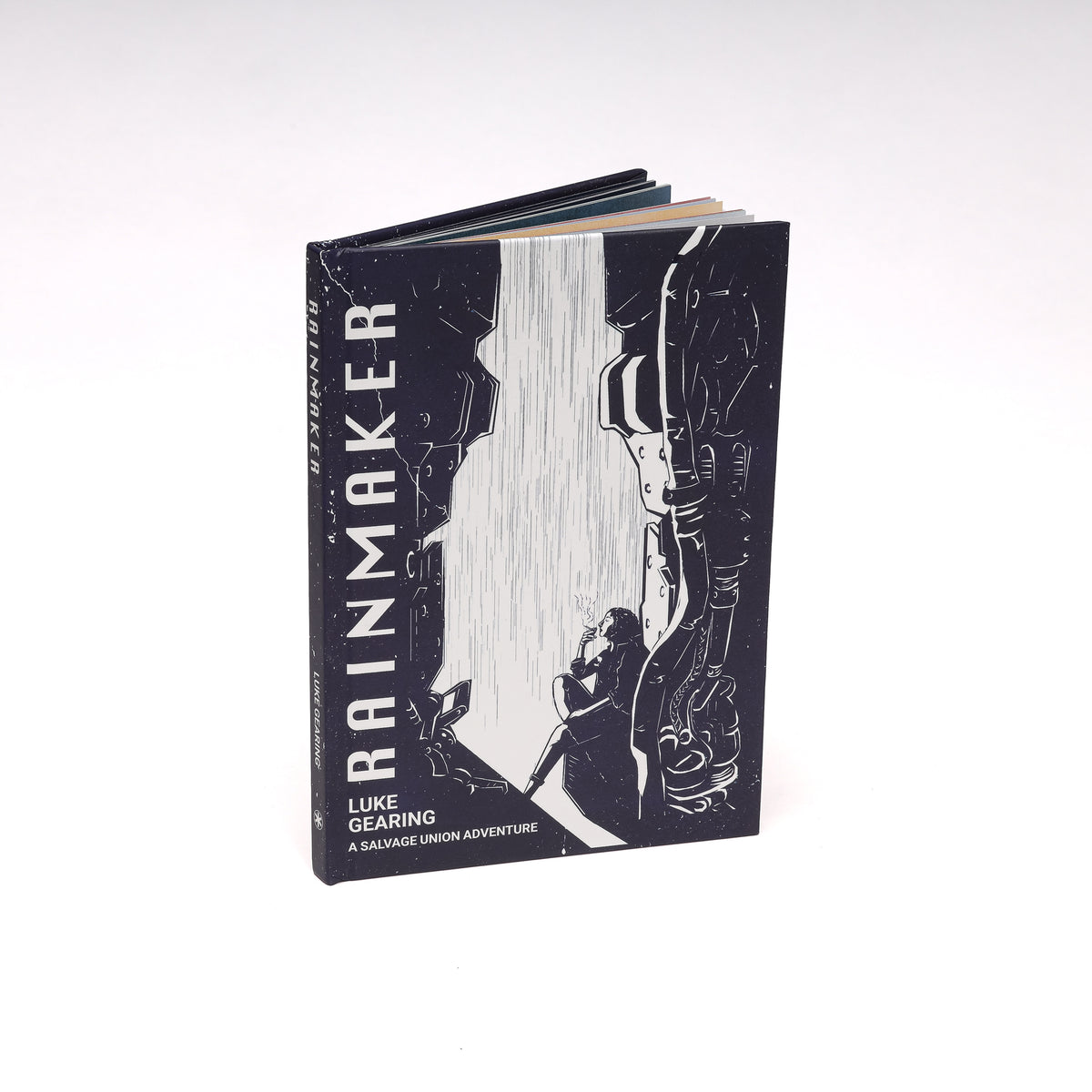This is part of a series of design blogs exploring the development of Salvage Union a post-apocalyptic mech tabletop roleplaying game currently live on Kickstarter here.
One of the most common pieces of playtest feedback we get for Salvage Union is to add stat modifiers, advantage or additional die bonuses or some variation thereof to the games core d20 mechanic. This article will explore why this is a bad idea for Salvage Union due to its different approach compared to other tabletop roleplaying games that do use such systems.
Salvage Union runs off of a core d20 variable resolution mechanic. This mechanic is flat for all rolls and both pilot characters and mechs all use this same table with no additional modifiers. There’s 5 different success levels as you can see below.

This roll is intended for situations in the game where the result is risky and has some consequence to it and is meant to broadly represent the machinations of fate and fortune rather than inherently be a reflection of character skill.
Let’s explore what adding an additional mechanical layer of modifiers or equivalent would add to the system.
When adding any mechanic we need to first ask ourselves why? The most common reason given as to why we should add modifiers is that it allows each of the classes within the game to differentiate themselves and have a niche.
So a Scout will be better at their scouting or stealth rolls, a soldier better at shooting things and a Hacker better at hacking stuff. This fits into the model of many tabletop RPG’s with the most common one that uses a d20 being the d20 system itself by Wizards of Coast used for Dungeons and Dragons.
Salvage Union doesn’t have stats that directly tie to character attributes such as Strength or Intelligence so we’d have a choice here of either adding character stats or adding circumstantial modifiers to rolls based on a set of skills that each character gets.

Adding stats would add a fairly complex layer to the proceedings as to justify including stats we would have to make them relevant throughout the entire rules set. It would also ruin the synergy of the mechs and pilots broadly functioning the same and perhaps necessitate adding mech stats as well, which may need to differ from pilot stats. Alternatively you could add rules that allow you to integrate your pilot stats within your mech but we’re already deep in the hole. Simpler solutions tend to be better especially as one of the design goals for Salvage Union is to keep it as simple as possible.
A skill list would be a cleaner implementation compared to stats that broadly attains the same goal of providing niche protection.
Let’s say we give each Pilot Class an additional skill list. A Scout maybe gets Stealth, Perception, Tracking and Fast Talking.
Let’s say to begin with this provides you a +2 to a roll that uses the skill that can then increase as you train/level to a max of say +5.
We have one immediate issue with this. Even a small bonus of a +2 means that the math for the flat d20 roll is now skewed. Overall success chance would increase to 85% from 75% with no chance of critical failure.

One important philosophy behind Salvage Union which is also good practice in general is to only roll a die when the situation is in some way risky and an interesting consequence could result from it. With no chance of a critical failure and success chance increased to 85% there would be significantly less risk involved in the die roll which would start to beg the question as to why we are rolling in the first place?
We’d also have a situation where we have results over 20 which don’t do anything. We could ignore this but it feels sloppy.
We could add another band of success for the core mechanic from 21-25. We could even specify a difference between natural 20 / 1 results. However at this point we’re adding multiple extra layers of complexity to the intended simple core mechanic. Including adding an additional band on top which would have to be some kind of ‘super success’ but only ones characters with skills can access. We’d be adding this effectively for the sake of having skill modifiers in the first place.
To counter this additional layer we could change the flat target to a variable one that The Mediator (GM) sets based on the ‘difficulty’ of the check.
However at this point the resolution mechanic starts to look a lot less like the variable, flat one hacked from Quest and a lot more like the d20 system in Dungeons & Dragons. In this system characters are rolling d20+modifier against a Difficulty Class (DC) value, which just isn’t the game we are designing here and would involve reworking the entire system.

Even ignoring these points the next question is how many skills do we even include? There’s 12 classes in the game, we could give them 4 skills each but players would likely want to pick more skills up as they play so perhaps we’d need to extend that to 6 or 8 skills. Then do we just add a general skill list instead of a class specific one? It would make sense but then what do we call these skills? Do we have a list of quite broad ones like Perception or Stealth, or specific ones like Database Hacking or Spelunking, or a mixture? More importantly, what do we lose by adding it?
Salvage Union is a narrative focussed game where players are encouraged to interact and engage with the fictional situation they are in to come up with clever ideas on how to resolve things.
During playtests we’ve had situations where players have used their mining rigs as impromptu flak launchers to deflect missile fire, caused a mini-avalanche to halt an approaching convoy of mechs and negotiated tense deals with wastelanders.

This is because the game actively encourages such play through a combination of the flat resolution mechanic assuming everyone is broadly competent at everything they do and the lack of a list of ‘skill buttons’ for players to press to resolve situations.
When you add skills to a system, especially an inherently light one like this, you get a few consequences.
- Players look to the skills to solve problems rather than thinking of creative solutions. They will want to use their ‘Fast Talking’ skill rather than actively negotiate and roleplay out a scene, or they’ll want to use their ‘Perception’ skill rather than describe how they’re exploring an environment.
- Even if players roleplay out these scenes at the back of their minds they’ll still ultimately just be looking to solve the situation by forcing it into one of their skills.
- Players who don’t have skills in certain areas will often choose not to engage in scenes because they’d rather let the character with the skill do it. This limits the overall engagement of play and narrows who can do things.
All of these things go against the narrative and freeform nature of play which makes Salvage Union so engaging to play.
What about Advantage/Disadvantage or Circumstantial Modifiers?
Advantage/Disadvantage is a mechanic that allows a player to roll an additional d20 on a roll and either pick the highest result if they have advantage or the lowest result if they have disadvantage. This is decided by the GM of the game based on circumstance, so someone trying to balance on a slippery floor might roll with disadvantage whilst someone shooting an arrow with the wind behind them might roll with advantage.
Situational modifiers work in a similar way allowing a GM to add a +2 or -2 to a roll based on circumstance.
We can probably disregard situational modifiers as they have many of the same issues skill modifiers do of changing the bands of success and adding an additional band beyond 20.
Advantage/Disadvantage could work on paper. We did playtest this but found in practice it did not work.
For one it’s not particularly interesting as a mechanic. The initial design of the game had many of the systems and modules as well as situations in the game simply grant advantage/disadvantage.
We decided to challenge ourselves when removing the mechanic to avoid using the mechanic as much as possible and this resulted in far more interesting and varied Systems, Modules and Abilities as well as impact during play..

As an example compare the two designs of the Targeting Module.
In the original design a Targeting Module simply gave you advantage to a roll. Powerful and effective certainly but not particularly interesting.
In the redesign the Targeting Module allows you for an Energy cost to target a specific System or Module on an opposing mech and entirely destroy it on a successful hit.
One offers a punchy, cool and immediate effect, the other lets you roll two dice…
We do have some pseudo advantage/disadvantage effects in a few places where we felt it was appropriate like the Evasion Module which forces someone who hits you to re-roll and pick the lowest result as a reaction but we kept it as minimal as possible throughout the design.
We also have a 'Push' mechanic which acts as an advantage of sorts but is far more of a risk/reward decision during play. You can choose to Push a roll which generates heat for your mech and triggers a Reactor Overload check. This can result in your mech shutting down, losing parts or even exploding if failed. You also have to accept the result of the second roll and don't get to pick the highest which means the math still stays flat but allows you to risk getting a higher roll within a tense situation. Pilots can push too and this works in a similar way but with stress instead of heat.

This felt like a far more interesting mechanical addition than a simple advantage/disadvantage system whilst still giving a player a way to try to smooth over a bad roll but at a cost.
Beyond this the addition of advantage/disadvantage, modifiers and skills within Salvage Union goes against the core use of the central die mechanic itself. If a roll within Salvage Union is significantly in the players favour enough to warrant an advantage it’s likely they don’t need to roll for it all as rolls should only be made if the situation is risky or warrants it in some way.
For example during a session a player used their Survey Scan ability to identify structural weak points on a skyscraper which had some rare salvage upon it they couldn’t reach on their mech. Another player then said they wanted to bring down the building, targeting those structural points with their missile pod in order to claim the salvage.
Them bringing the building down at this point is a given, not only is a building a static target which should be simple to hit but they’ve even identified the perfect points to hit it. We could give them a roll with advantage or a modifier if we were using that system but it’s moot, the thing is going to happen, what really matters is the resulting fallout from it.
Running this myself I asked the player to roll but the roll was not to see if they brought the building down but to see if they were fortunate enough to recover the salvage.
This requires thinking about a roll not in terms of the thing the player is specifically trying to do, like shoot down a building, but the overall intent of the action itself. To shoot down a building in order to claim the salvage on top of it.
During play the player rolled a success and so the building came down and they got the salvage, however this might have resulted in a tough decision like deciding between taking damage in the wreckage or claiming the salvage, or the salvage being destroyed in the wreckage had they got particularly unlucky.

The key difference here is that the roll still changes the situation as whatever happens the building is hit and coming down which means play doesn’t ever stall at a roll simply failing and nothing happening. Furthermore the focus becomes on what the player wants to do in the fictional situation. If the player had thought of a less destructive way to get the salvage then naturally the potential consequences wouldn’t be ones that involve it getting destroyed or a skyscraper falling on them or their companions.
A particularly smart solution might not have needed a roll at all depending on the context. This forces players to think about the environment rather than leaning towards a set of skill buttons to resolve the issue. This goes to encourage player skill and creativity within a situation which is what we want from the game and avoids players simply looking at their character sheets to resolve problem.
Hopefully that covers some of the deeper design decisions as to why we are avoiding adding stats, skills and modifiers to the game though please do leave any thoughts you have in the comments.

Salvage Union does have one way it differentiates the various classes as well as mechs within the game which is through its ability system. Pilots have access to a set of unique abilities they can use in situations which they typically have to spend a limited amount of Ability Points on, these range from always being able to go first in combat or being able to negotiate a tough trade deal. Whilst Mechs have Systems and Modules which similarly have a range of abilities that can be activated with Energy Points that range from being able to destroy opposing mechs parts to scanning areas for dangers.
We’ll be exploring the specific design of these in more detail during our next blog.
Thankyou for reading.
Interested in playing Salvage Union?
Salvage Union is now available to buy here.
You can download the free QuickStart here - https://leyline.press/products/salvage-union-beta-quickstart-digital-edition-pdf
You can join the Salvage Union Discord here - https://discord.gg/gmM6jTT8qm
Follow Salvage Union on Twitter - @salvageunion
Follow Salvage Union on Instagram - @salvageunion
Subscribe to the Leyline Press newsletter here to receive updates Salvage Union and our other games.






3 comments
I love this. Again, after the explanation it makes so much sense. It’s so funny, it’s like so many of us have to unlearn habits, tropes, crutches, etc that we’ve come to rely on from other games. It’s not that they’re bad, it’s just that we don’t need them for every last tabletop game and people get stuck in one mode of thinking. I hope to see more folks like yourselves helping to break the moulds.
> Is the goal here to not have Push be abused if it were to offer advantage
That’s exactly the goal. We found in testing that pretty much every situation a player was in could be argued to have some kind of ‘advantage’ which meant that most rolls could be rolled with it and wanted to avoid that.
>From someone who has played a lot of tactical RPGs, 75% is no guarantee.
So the other thing we wanted to encourage was players not rolling the die. It’s a solid chance of success but not a guarantee and if players can figure out a clever solution to something they may not need to roll at all or at least significantly lower the risk of consequence so if the die does fail it doesn’t quite sting as much.
>The idea that I can push my mech to re-roll a die and keep a 75% success rate doesn’t seem that appealing
Perhaps on paper though in practice during the heat of the moment in play players often want to change that natural 1 or even an 7 to something more solid.
>Maybe advantage would make Pushing overpowered
Yeah both systems combined would probably be a bit too powerful, or more specifically we want to encourage in play a combination of some consequences being inevitable as it’s interesting for players to deal with consequences and for die rolling to be risky and in a sense discouraged compared to interacting directly with the fiction.
That being said we’d encourage you to play the game and add whatever house rules you want to it and see how they go!
Appreciate all the feedback and other comments on the two other blogs too by the way!
I still feel torn on the “Push” mechanic. I understand not wanting to change the math on the rolling mechanic. Is the goal here to not have Push be abused if it were to offer advantage. From someone who has played a lot of tactical RPGs, 75% is no guarantee. The idea that I can push my mech to re-roll a die and keep a 75% success rate doesn’t seem that appealing. Maybe advantage would make Pushing overpowered though since effectively all heat and stress are removed between battles/encounters as it only takes 10 minutes of rest time to vent all heat and relieve all stress?